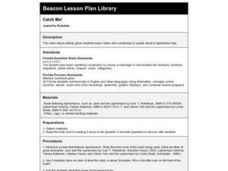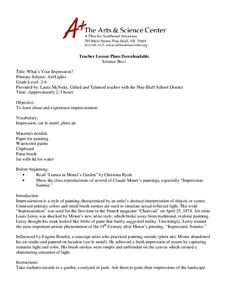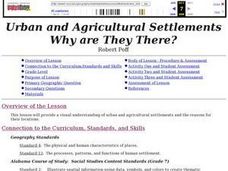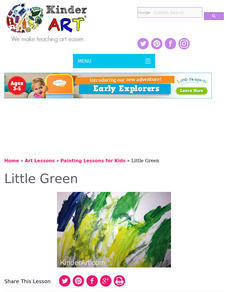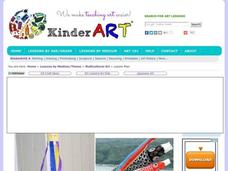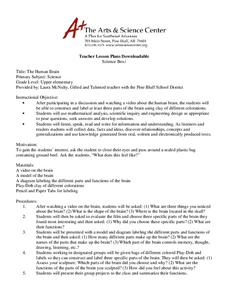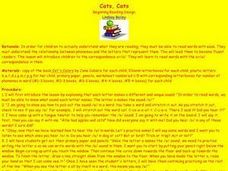Curated OER
Raindrops Keep Falling on my Art
Kids may be a little resistant to this rainy day idea, but it could produce some amazing art. They paint a watercolor picture of anything they like. When they are done, they take their paintings outside and let the rain work its magic!...
Curated OER
Seashell Painting
Let nature inspire your budding artists. They paint seascapes on actual seashells. First, they observe the seaside, then they paint what they see (image or in person) on the inside of a white shell.
Curated OER
Connotation in Propaganda
High schoolers assess persuasive techniques in propaganda. They identify and critique rhetorical devices in primary source documents (sources are not specified, but links to sites that contain various documents are included). Groups make...
Curated OER
Catch Me!
Primary learners will listen to a story about leprechauns and discuss what they look like and how they act. Then they will construct leprechaun traps to try and catch one. They must explain how their trap works using complete sentences....
Weston Wood
Joseph Had a Little Overcoat
Create a cross-curricular learning experience based on the children's book Joseph Had a Little Overcoat with this collection of learning activities. Starting with a class reading of the story, children go on to learn about the sequence...
Curated OER
Crayon Resist
Kids usually love crayon resist projects. It is so fascinating for them to see how the dark paint accentuates and resists the waxy crayon. Here are instructions for executing a crayon resist project of your own. Tip: Make the project fit...
Curated OER
What's Your Impression?
Young scholars paint landscapes. In this Impressionism lesson, students explore the history behind the Impressionist Movement in art and paint their own impressionist piece inspired by a nearby landscape.
Curated OER
Urban and Agricultural Settlements Why are They There?
Seventh graders identify types of human settlements, urban and agricultural, and determine geographic influence on why people settle where they did by use of maps and charts. They, in groups, identify the needs of a new settlement, which...
Curated OER
Little Green
Students explore how to make the color green by mixing the two primary colors, blue and yellow.
Curated OER
Japanese Abstract Wind Sock
Learners create Abstract Wind Socks using brown paper bags, markers, kite string, and basic art supplies in this Art lesson for the elementary classroom. Abstract concepts are emphasized and it is recommended to only use primary colors.
Curated OER
The Science of Color
Students use the scientific method to explore how to make different colors with paint. They problem solve ways to darken and lighten colors without using black and white paint. Students hypothesize how to create new colors, and describe...
Curated OER
Color
In this color instructional activity, students read where light comes from and the different colors created through a prism. Students compare light (additive color) with pigments (subtractive color). Then students complete 1 drawing, 6...
Curated OER
Pointillism Landscapes
Students examine Impressionist and Post-Impressionist works of art, use watercolors to create effects of light, color, and shadow, consider what ideas are important and what ideas they want to visually communicate, and paint their own...
Curated OER
The Human Brain
Students identify parts of the human brain. In this biology instructional activity, students watch a video about the human brain. Students use different colors of clay to construct and label the three parts of the brain.
Curated OER
Ratification & Review
Students work with their parents to decorate strips of construction paper in primary colors to represent one family member per link on the chain. They sing a gathering song and all share their family chains. They read the story of the...
Astronomical Society of the Pacific
Toilet Paper Solar System
Can we model how large the solar system really is? Attempt an astronomical feat with a hands-on-activity that uses a roll of toilet paper. Young scientists measure the distances of the planets from the sun to create a scale model of the...
Curated OER
Cats, Cats
Students complete a variety of activities related to the short /a/ sound. As a class they recite a tongue twister, then trace and write the letter A. Students then spell different words containing the short /a/ sound, listen to the book...
Curated OER
BEGINNER LEVEL LESSON PLAN
Students are be able to analyze primary sources (photographs) for evidence of Native American culture and construct a cultural symbol. They are explained what the stars and stripes stand for on the American flag. Students work as...
Curated OER
Put a Rainbow on Your Plate
In this nutrition worksheet, students investigate the importance of eating fruits and vegetables of different colors 5 times a day. Students complete 8 pages of activities such as menu planning, shopping lists, word search, word...
Curated OER
Baked Polymer Clay 3D People Portraits
Students discuss methods of building forms with clay (ball and variations, snake, flat sheets). They draw a stick figure of what their sculpture may look like, including correct figure proportion.
Curated OER
Poetry and Paintings: A Comparative Study
Students find words for different feelings: sad, happy, annoyed, bored, puzzled, etc.
They think of colors which seem to fit each feeling. A painting is introduced and they are asked to verbalize how it makes them feel. What mood does...
Curated OER
How Plants Spice Up Our Lives
Third graders study plants. In this biology lesson plan, 3rd graders label and identify parts of plants, identify spices obtained from plants, and determine what part of a plant a spice comes from by using taste, touch, smell and sight.
Curated OER
Cool School Tools
Students outline several objects such as glue bottles, large paint brushes, scissors, etc. They add a few details to each object such as labels, handles, etc. and then draw two vertical lines and two horizontal lines across the page.
Curated OER
Underwater Vision
Students use colored lights and fabric to study an underwater ocean scene. In this light study lesson plan, students draw a picture using colored markers and hypothesize what their drawing will look like using filters. Students study...





